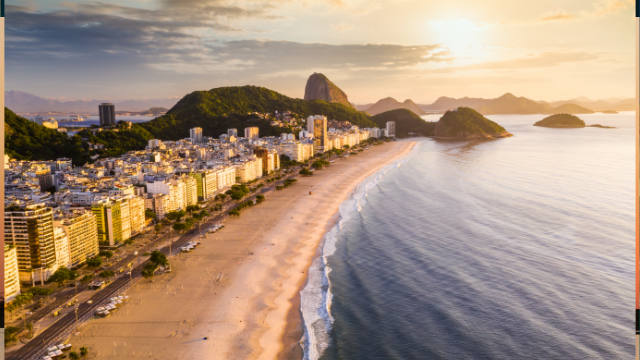Brazil

Immerse yourself in the enchanting rhythms and vibrant culture of Brazil, a travel destination that dances to a beat all its own. As you journey through this vast country, you'll be captivated by a kaleidoscope of experiences: the throbbing pulse of Rio de Janeiro's samba beats that echo along the sun-kissed Copacabana beaches, the awe-inspiring roar of Iguaçu Falls as mist envelops you in a refreshing embrace, and the intoxicating aroma of churrasco wafting through the air, igniting your sense of taste with each savory bite. Travel to Brazil and discover the lush Amazon rainforest, where the symphony of wildlife creates a natural soundtrack as colorful macaws soar overhead. The allure of Brazil is irresistible, a blend of electrifying urban jungles and serene pockets of untouched nature, inviting you to indulge your senses and write your own adventure.
Brazil Travel Season
Travel to Brazil offers a diverse experience throughout the year, with distinct seasons that cater to different types of travelers. While Brazil is a year-round destination due to its vast landscape and climate variations, the best travel season largely depends on the region you plan to visit and the experiences you seek. Generally, Brazil's peak travel season falls during its summer months, which span from December to February. During this time, the country is bustling with energy, festivities, and a vibrant atmosphere. However, travelers should be aware that this is also a time when the major tourist areas are most crowded, and prices for flights and accommodations are at their highest.
For those looking to travel to Brazil during a more tranquil period, the shoulder seasons, which include March to May and September to November, can be ideal. These months offer favorable weather conditions with mild temperatures and less humidity. Traveling during these times means you can enjoy popular attractions without the heavy crowds and often find better deals on accommodations and travel packages. Additionally, nature enthusiasts may appreciate the lush scenery as the landscapes come alive after the rainy season in many parts of Brazil.
Brazil’s diverse geography means that regional climate differences can significantly impact your travel experience. The Amazon region, for instance, experiences a tropical climate, and the wet season, from December to May, can entail heavy rainfall. However, traveling to the Amazon during the off-peak period can offer unique advantages. Water levels are higher, providing enhanced access to waterways and opportunities to see different wildlife. Meanwhile, the Brazilian winter, from June to August, is a good time for travelers who prefer cooler temperatures and smaller crowds, especially in southern regions like São Paulo and Porto Alegre.
Local events and holidays can also influence the best time to travel to Brazil. The Carnival, usually held in February or early March, is an iconic celebration that draws visitors from around the world to cities like Rio de Janeiro, Salvador, and Recife. Although this period is part of the peak season with large crowds and elevated prices, experiencing Carnival’s vibrant parades and street parties is a once-in-a-lifetime experience. On the other hand, visiting Brazil during off-peak times can provide an opportunity to indulge in local culture without the hustle and bustle of major events.
Travelers should also consider unique seasonal events such as Festa Junina, a traditional Brazilian festival celebrated in June, which includes colorful costumes, folk music, and delicious local treats. For those interested in a more serene Brazilian experience, the Pantanal’s dry season from July to October is ideal for wildlife spotting, as animals gather around the shrinking waterholes making them easier to see. Overall, the optimal travel experience in Brazil will depend on personal preferences, desired activities, and willingness to adapt to varying climates.
The Weather and Seasons in Brazil
Brazil, a vast and diverse country, offers a rich tapestry of weather patterns that vary depending on the region and time of year. Travelers planning to visit Brazil should consider the diverse climate zones, ranging from tropical in the north to temperate in the south, each offering unique experiences throughout the seasons.
Tropical North and Amazon Region
In the tropical north of Brazil, including the Amazon Rainforest, the climate remains consistently warm and humid throughout the year. Temperatures typically range from 77°F to 86°F (25°C to 30°C). Travelers can expect substantial rainfall, especially between December and May. This period sees the highest humidity levels, often exceeding 80%, making for a lush and verdant landscape. Despite the rain, this time of year can be ideal for visitors wishing to experience the Amazon in its full, thriving beauty.
Coastal Northeast
The coastal northeast of Brazil, home to cities like Salvador and Recife, enjoys a tropical climate with year-round warmth. Temperatures generally hover between 75°F and 90°F (24°C to 32°C). The wet season runs from April to July, with brief, intense showers usually occurring in the afternoon, while the rest of the year remains relatively dry. This region is perfect for beach lovers, with favorable weather conditions for travel typically found from August through March, providing ample sunshine and lower rainfall.
Central Brazil and the Pantanal
Central Brazil, including the Pantanal, experiences a tropical savanna climate. The dry season from May to September boasts warm days averaging 86°F (30°C) and cooler nights dropping to around 64°F (18°C). This period presents excellent opportunities for wildlife viewing in the Pantanal, as animals congregate near water sources in the drier months. Conversely, the rainy season spans from October to March, with higher humidity and temperatures that can climb to 95°F (35°C), causing some areas to become inundated and challenging to access.
South and Southeastern Brazil
The southern and southeastern parts of Brazil, encompassing cities like São Paulo and Porto Alegre, experience more defined seasons. Summer, from December to February, presents warm to hot temperatures, ranging from 68°F to 86°F (20°C to 30°C), often accompanied by thunderstorms. Winter months, June through August, are generally mild, with temperatures between 50°F and 68°F (10°C to 20°C). Travelers planning To visit the south of Brazil may find spring (September to November) and autumn (March to May) to offer pleasant weather, suitable for city explorations and cultural events.
Rio de Janeiro
Rio de Janeiro, a top travel destination in Brazil, features a tropical monsoon climate. Temperatures are fairly consistent, typically ranging from 70°F to 85°F (21°C to 29°C) year-round. The rainy season spans December to March, with daily highs often reaching 100°F (38°C) coupled with high humidity. For those looking to enjoy outdoor activities and sightseeing, May through September can be optimal, with drier conditions and cooler temperatures making travel to this iconic Brazilian city more comfortable.
When planning to travel to Brazil, it's essential to consider seasonal events and festivals that coincide with specific weather patterns. For instance, Carnaval, celebrated in February or March, occurs during the summer season but also the rainy period in many regions, adding vibrancy amidst tropical downpours. From exploring the depths of the Amazon to sunbathing along stunning coastlines, Brazil presents a climatic diversity that caters to varied interests, ensuring an unforgettable travel experience any time of the year.
Accepted Payment Methods and Other Payment Information in Brazil
When you travel to Brazil, understanding the local payment options is essential for a smooth experience. The official currency of Brazil is the Brazilian Real (BRL). It's important to know that while credit and debit cards are widely accepted across major cities, having some cash on hand is advisable, especially when visiting more remote areas or smaller establishments.
Credit card usage in Brazil is quite prevalent, with Visa, Mastercard, and American Express being the most commonly accepted. However, Discover card acceptance is much less frequent, so it's wise to have an alternative card option if you rely on Discover. Due to varying acceptance, it's always a good idea to verify with your card issuer about any restrictions or international usage policies that may affect your cards during your travel to Brazil.
While credit cards are popular, cash is still used extensively, particularly for smaller transactions or at places like local markets and kiosks. ATMs are readily available in urban areas, and withdrawing cash as needed can be a convenient way to manage travel expenses in Brazil. Remember, some ATMs may close during late-night hours for security reasons, so plan your withdrawals accordingly.
Tipping in Brazil is relatively straightforward. A 10% service charge is often included in restaurant bills, but if it’s not, leaving a 10% tip is considered polite and appreciated. For exceptional service, 15% is a generous gesture. Tipping taxi drivers is not mandatory, though rounding up the fare is common practice. Hotel staff may expect a small tip for services like carrying luggage or room service.
In addition to credit cards and cash, Brazil has seen a rise in mobile payment platforms. While these are more typically used by locals, travelers may find them handy depending on the duration of their stay and their access to mobile-friendly banking solutions. As you travel to Brazil, it's beneficial to explore these options especially if planning an extended visit.
Another important aspect to keep in mind when you travel to Brazil is the potential use of a CPF number, a Brazilian taxpayer identification number. While not usually required for tourists, some high-value purchases or online transactions may request a CPF. In such cases, consulting with the vendor can often offer alternative solutions.
Overall, navigating payment options in Brazil is generally straightforward if you are equipped with a range of methods from cash to card. Being informed about where and how you can utilize them enhances convenience and ensures you're prepared for various situations during your travel to Brazil.
Why You Should Travel to Brazil
Brazil's allure beckons travelers with its captivating blend of vibrant culture, stunning landscapes, and unforgettable experiences. Whether you're a first-time visitor or a seasoned traveler, Brazil offers something unique for every type of explorer.
Dance to the Rhythms of Rio Carnival
Travel to Brazil and immerse yourself in the world-famous Rio Carnival, a dazzling spectacle of color, music, and joyous celebration. This cultural extravaganza offers travelers the chance to witness elaborate parades, samba schools, and vibrant street parties. Participating in Rio Carnival is an extraordinary cultural experience that leaves a lasting impression on anyone fortunate enough to join the festivities.
Explore the Amazon Rainforest
Adventure seekers will find the Amazon Rainforest a must-visit destination. Spanning over a vast expanse, the Amazon offers unique opportunities to witness its rich biodiversity. Traveling deep into this lush wilderness, voyagers can spot exotic wildlife, explore vibrant ecosystems, and learn about indigenous cultures that call this lush basin home. Guided excursions provide insight into the natural world, making it a travel highlight in Brazil.
Relax on Stunning Beaches
Brazil is synonymous with some of the world’s most breathtaking beaches. From the lively shores of Copacabana and Ipanema to the tranquil beauty of Fernando de Noronha, beach lovers can find their perfect seaside escape. These beautiful stretches of sand offer diverse experiences, from snorkeling in crystal-clear waters to enjoying vibrant local beach culture. It's a seaside paradise that beckons visitors with its sun-drenched allure.
Marvel at Iguazu Falls
One of the natural wonders that makes travel to Brazil so enticing is Iguazu Falls. This majestic waterfall system is one of the largest and most impressive in the world, providing awe-inspiring vistas that captivate visitors. Surrounded by lush rainforest, Iguazu Falls offers numerous viewing points, including thrilling boat rides that take adventurers close to the thundering cascades. It's an unforgettable encounter with nature's raw power and beauty.
Experience Iconic Landmarks
Explorers will find countless iconic landmarks scattered throughout Brazil. The towering Christ the Redeemer statue in Rio de Janeiro offers panoramic views of the city, while Brasília, the country’s modernist capital, showcases unique architectural achievements. Each landmark tells a story that reflects Brazil's diverse heritage and vibrant culture, providing travelers with memorable experiences and photo opportunities.
Delight in Diverse Cuisine
Brazil's culinary scene is a melting pot of flavors and influences. Travelers can savor traditional dishes such as feijoada, a hearty bean stew, and pão de queijo, delicious cheese bread. Street food markets and upscale restaurants alike offer a taste of the country's unique culinary identity, enriched by indigenous, African, and European influences. Food enthusiasts will find travel to Brazil a delightful journey for the taste buds.
Immerse in the Rich Culture
Brazil is a cultural tapestry, offering a wealth of experiences for those eager to learn more about its traditions and way of life. From the rhythmic beats of samba and bossa nova to the vibrant art and literature, Brazil's cultural scene is as diverse as its landscape. Visiting vibrant neighborhoods and historic cities like Salvador provides a deeper understanding of Brazil’s rich cultural heritage.
Adventure in Pantanal Wetlands
For wildlife enthusiasts and nature lovers, the Pantanal wetlands are an extraordinary destination. As the world's largest tropical wetland, it is a biodiversity hotspot teeming with unique wildlife. Visitors can embark on thrilling safaris to see jaguars, caimans, and an array of bird species. This ecological gem is renowned for its unrivaled wildlife viewing, making it a must-visit for any travel itinerary in Brazil.
Discover Vibrant Urban Life
Brazil's cities pulse with energy and heart. Urbanites will love cities like São Paulo, a dynamic metropolis with a thriving arts and entertainment scene. Meanwhile, Rio de Janeiro’s spectacular scenery and lively city life offer countless entertainment options. Exploring these bustling cityscapes gives travelers insight into the modern vitality of Brazilian life, contrasted against its stunning natural settings.
Embrace the Warmth of Brazilian Hospitality
One of the most compelling reasons to travel to Brazil is the warmth and friendliness of its people. Known for their vibrant spirit and genuine warmth, Brazilians welcome visitors with open arms. Whether sharing a meal, teaching a few samba steps, or guiding you through hidden gems, the people of Brazil make every traveler’s journey special with their gracious hospitality.
The History of Brazil
Travel enthusiasts often find themselves seduced by the allure of Brazil, a nation whose history is as vibrant and diverse as its landscape. Long before it became a focal point for world explorers, Brazil was home to indigenous tribes such as the Tupi, Tapuia, and the Carajá. With Pedro Álvares Cabral's arrival in 1500, Brazil became a cornerstone in the Portuguese Empire. The colonial period saw sugarcane becoming the primary product, shaping Brazil's economy and leading to a significant African slave trade. This painful past laid the cultural groundwork for Brazil's modern identity, fostering a rich tapestry of traditions, cuisines, and musical genres like samba and bossa nova, captivating anyone who decides to travel to Brazil.
Travel to Brazil offers history lovers a chance to explore important landmarks that narrate the country's journey from its imperial past to a republic. Rio de Janeiro, once the capital of both the colony and the empire, retains its historical architecture from the opulent Theatro Municipal to the Boulevard of Avenida Rio Branco. The city of Salvador, with its Pelourinho district, exemplifies Brazil's African influence and colonial architecture, characterized by colorful buildings and cobblestone streets. The gold rush of the 18th century led to the flourishing of Minas Gerais, where towns like Ouro Preto and Tiradentes boast extravagant Baroque churches that history buffs find mesmerizing. These architectural masterpieces not only showcase the opulence of Brazil's colonial past but also serve as a reminder of the indigenous and enslaves' plight.
The journey into Brazil's history must include its path toward independence and the subsequent formation of the republic. In 1822, Dom Pedro I declared Brazil's independence from Portugal, a moment immortalized by the Monument of Independence in São Paulo. The abolishment of slavery in 1888 and the proclamation of the republic a year later were monumental milestones, etched into Brazil's national consciousness with various statues, museums, and archives scattered throughout the country. The historical narrative also unfolds in the political sphere with the rise and fall of leaders such as Getúlio Vargas, who shaped modern Brazil through industrialization and social reforms, leaving behind a legacy that stakeholders continually study and strive to understand in contemporary politics.
Cultural heritage in Brazil is an odyssey through a myriad of festivals, cuisines, and art, all tightly woven into the stories of its people. The vibrant Carnival, arguably Brazil's most famous cultural export, is a week-long celebration of life, rhythm, and history, attracting millions to travel to Brazil every year for a spectacle of parades and parties. The cultural implications of Brazil's heritage offer endless exploration opportunities, whether through the bustling streets of São Paulo and its art scene or the Amazon's tribal rituals, where ancient traditions explain the indigenous connection to the land. As one travels through Brazil, each region offers a different narrative thread, contributing to a broader understanding of how Brazil conjures an irresistible charm to history lovers and adventure seekers alike.
The Culture of Brazil
Brazil is a mesmerizing tapestry of cultures woven together through centuries of rich history and immigration, making it an unparalleled destination for travelers. When you travel to Brazil, you're greeted by a vibrant mix of traditions that reflect the diversity of its people. The country's cultural expressions are as diverse as its landscape, from the intoxicating rhythms of samba to the intricate footwork of capoeira, a martial art that doubles as a dance form. Samba, probably the most famous cultural export, brings the streets to life, especially during the spectacular Carnaval. This annual celebration attracts millions from around the globe to witness vibrant parades, dazzling costumes, and a joyous fusion of African, Indigenous, and Portuguese influences. Experiencing Carnaval is one of many compelling reasons to travel to Brazil and immerse oneself in its exuberant culture.
Brazil's festivals and daily customs offer a never-ending array of experiences for travelers. Apart from Carnaval, the Festa Junina in June is a celebration that showcases the country’s rural traditions with colorful attire, traditional foods, and lively dance. It's a cultural delight that reflects Brazil's agrarian roots and regional diversity. Meanwhile, on a day-to-day basis, the Brazilian way of life is marked by a spirit of community and warmth. Brazilians are known for their hospitality, as well as their love for outdoor gatherings and barbecues, known locally as 'churrasco'. These social gatherings are not just about food, but also about sharing stories, laughter, and creating bonds, giving travelers an authentic insight into the Brazilian soul.
The multicultural makeup of Brazil's population is a vibrant blend influenced by waves of immigrants from European countries, the Middle East, Asia, and Africa over the centuries. This rich diversity has profoundly shaped Brazil's culinary scene, architecture, languages, and more. In cities like São Paulo and Rio de Janeiro, travelers can expect to find neighborhoods that tell the stories of various ethnic groups, each offering their unique flavors and contributions. The fusion of these cultures fosters an environment where cultural expressions like music, dance, and art flourish, revealing a dynamic society constantly evolving yet rooted in deep traditions.
Brazil also honors its indigenous heritage with ongoing cultural preservation efforts. Despite modern challenges, indigenous groups across the Amazon and other regions strive to maintain their traditions and languages, offering travelers a chance to explore ancient ways of life still practiced today. Visits to these communities can provide invaluable perspectives on sustainability, nature's interconnectedness, and the historical significance of Brazil's indigenous peoples. This deep, cultural engagement with the land and its people is one of the profound legacies you experience when you travel to Brazil, making it an unrivaled destination for those in search of cultural enrichment.
The Culinary Experience of Brazil
When you travel to Brazil, prepare your senses for a vibrant and diverse culinary journey that mirrors the country's multicultural heritage and passion for food. Brazilian cuisine is an amalgamation of flavors influenced by indigenous ingredients, African traditions, and Portuguese recipes, resulting in dishes that are both unique and deeply rooted in history. From the Amazon to the southern pampas, each region in Brazil offers a distinct culinary identity, making it a gastronomic paradise. The widespread use of fresh tropical fruits, regional spices, and aromatic herbs define the local food scene, ensuring that every meal offers an explosion of flavors.
No culinary journey in Brazil is complete without sampling its must-try dishes. Feijoada, a comforting stew made from black beans and a variety of meats, is a national favorite typically enjoyed during a leisurely Sunday lunch. Another must-try is Moqueca, a fragrant seafood stew cooked in coconut milk and dendê oil, showcasing the African influences in Brazilian cooking. For those indulging in street food, the ubiquitous coxinha—delicious crispy fried dough filled with shredded chicken—cannot be missed. Also, the pão de queijo, warm and cheesy bread bites, are perfect for enjoying during an afternoon snack. While exploring the vast culinary landscape when you travel to Brazil, be sure to also taste acarajé, made from black-eyed peas and typically deep-fried and stuffed with spicy shrimp paste, which celebrates the cultural heritage of the Afro-Brazilian communities.
Beverages play a significant role in Brazil's culinary culture, offering refreshment and delight in equal measure. Cachaça, Brazil's signature spirit distilled from sugarcane, forms the base of the world-renowned cocktail caipirinha, a must-drink during any visit. Beer enthusiasts will find a burgeoning craft beer scene, with local breweries experimenting with native ingredients like Amazonian fruits and spices. Brazil also has a growing reputation in the wine industry, especially in the southern regions where vineyards thrive in the temperate climate. Don't miss the chance to savor vinho verde, a lightly sparkling, young wine, perfect for pairing with much of the local cuisine. Coffee lovers should indulge in a cup of rich Brazilian coffee, an integral part of daily life in Brazil and a treat for the senses.
Dining experiences in Brazil vary from bustling food markets to upscale fine dining establishments, each offering a taste of the country's culinary richness. The vibrant street food scene is a tapestry of regional specialties, allowing travelers to sample diverse flavors at affordable prices. Cities like São Paulo and Rio de Janeiro boast sophisticated dining scenes, with restaurants where Michelin-starred chefs blend traditional ingredients with modern techniques. For those visiting during festive times, Brazil's carnival and various food festivals throughout the year highlight seasonal dishes and showcase the country's joyous approach to food and life. Food markets like São Paulo's Mercado Municipal offer a plethora of fresh produce and local goods, ideal for a culinary exploration. There are also growing options for vegetarians and vegans, especially in major urban centers, providing dishes that creatively use Brazil's abundant produce.
What to See and Do in Brazil
Travel enthusiasts eager to explore Brazil will find their wanderlust well satisfied by the country's rich tapestry of culture, natural wonders, and vibrant urban experiences. The allure of Brazil cannot be overstated, offering a plethora of activities that cater to solo travelers, families, and adventure seekers alike.
Marvel at the Majestic Iguazu Falls
Tucked away between Brazil and Argentina, Iguazu Falls captivates with its sheer power and beauty. Visitors can stand in awe of the thundering cascades from platforms that bring you tantalizingly close to the falls themselves. Adventure seekers traveling to Brazil can embark on a boat tour to feel the spray on their faces, while families will find the extensive walkways offer stunning panoramic views. This natural wonder is a must-see for anyone visiting Brazil.
Immerse Yourself in Rio de Janeiro’s Carnival
Rio de Janeiro's Carnival is the epitome of Brazilian culture, showcasing the country's passion for dance, music, and celebration. Held annually, this vibrant festival transforms the city into a whirlwind of color and rhythm that draws in revelers from around the world. Solo travelers can lose themselves in the pulsating samba beats, while families can enjoy the parade’s elaborate floats and costumes. It's an invigorating experience that embodies the spirit of Brazil and is sure to create unforgettable memories.
Relax on the Sands of Copacabana Beach
Copacabana Beach in Rio de Janeiro is the quintessential Brazilian beach experience. Lined with palm trees and lively kiosks, this sweeping stretch of golden sand is perfect for relaxation or people-watching. Travelers watching their first sunset in Brazil will be enthralled by the vibrant evening sky above the Atlantic. Whether you are a solo traveler looking to soak up the sun or a family wanting a day of fun by the sea, Copacabana does not disappoint.
Venture into the Amazon Rainforest
No travel to Brazil is complete without a foray into the Amazon Rainforest, an adventure that promises encounters with diverse wildlife and exotic flora. Guided tours offer a safe way to explore this vast ecosystem, where the echo of howler monkeys and the sight of vibrant macaws are common. Eco-lodges provide a home base for families, while solo travelers can enjoy the meditative solitude of the jungle. With its untamed beauty, the Amazon is a vital part of the Brazilian experience.
Explore the Rich History of Salvador
In the northeastern region, Salvador is a city steeped in Afro-Brazilian culture and colonial history. Wander through Pelourinho, the historic center filled with colorful buildings and cobblestone streets, and visit its beautiful baroque churches. Travelers to Brazil will appreciate the lively atmosphere, historic architecture, and rich cultural significance of Salvador. Families can enjoy traditional Bahian cuisine at local eateries, while solo travelers might find the Capoeira performances particularly striking.
Discover the Unspoiled Beauty of Lençóis Maranhenses National Park
Located in northeastern Brazil, Lençóis Maranhenses National Park offers a surreal landscape of vast, white sand dunes interspersed with crystal-clear freshwater lagoons. For adventure seekers traveling to Brazil, the best way to explore is by taking a guided off-road tour that covers the park's expansive area. Walk the trails, swim in the lagoons, and marvel at the unique interplay of sand and water. This hidden gem is a perfect escape from the bustling cities, promising peace amidst incredible natural beauty.
Celebrate New Year at the Copacabana Beach Fireworks
Ring in the New Year in spectacular fashion with the mesmerizing fireworks display at Copacabana Beach in Rio de Janeiro. Widely regarded as one of the biggest New Year’s Eve celebrations in the world, it features music shows, samba performances, and a festive atmosphere that electrifies the night. Ideal for travelers of all kinds, this event offers a perfect blend of joy and excitement, as colorful explosions light up the Brazilian sky.
Savor Authentic Brazilian Cuisine in São Paulo
The bustling metropolis of São Paulo is a culinary paradise that promises a gastronomic journey through diverse flavors and traditional dishes. Foodies traveling to Brazil should explore traditional street food like coxinhas and feijoada, or indulge in a rodizio-style barbeque experience at a churrascaria. Families and solo travelers alike can explore the city's eclectic dining scene, which artfully mingles Brazilian flavors with international influences.
Admire the Architectural Masterpiece of Brasília
Built in the 1960s, Brasília is a testament to modernist architecture, with its futuristic buildings and meticulous urban planning. The city, designed by architect Oscar Niemeyer, is marked by iconic structures like the Brasília Cathedral, known for its striking glass roof, and the Palácio da Alvorada, the presidential residence. Travelers to Brazil should explore this UNESCO World Heritage site to appreciate its architectural innovation and artistic beauty.
Experience the Vibrant Nightlife of São Paulo
São Paulo, Brazil's energetic urban hub, offers a nightlife experience that rivals any major city worldwide. From sophisticated bars in Vila Madalena to bustling clubs in the heart of the city, São Paulo caters to night owls eager to dance to anything from samba to electronic beats. Solo travelers and groups will find an array of venues that reflect the city's diverse music scene, making São Paulo a dynamic starting point for a night out in Brazil.
Tips & Tricks for Traveling in Brazil
Learn Basic Portuguese for a Deeper Experience
While traveling to Brazil, English may not always be widely spoken outside major tourist centers. A great way to enhance your travel experience is by learning some basic Portuguese phrases. Not only does this open up opportunities for smoother interactions with locals, but it also shows respect for the culture. A simple "Bom dia" (good morning) or "Obrigado/Obrigada" (thank you) can go a long way in creating a positive impression. Additionally, having a pocket dictionary or translation app handy can be invaluable for more complex conversations. Engaging with the local language can enrich your travel stories and allow for more meaningful connections.
Utilize Brazil's Extensive Bus Network
Traveling around Brazil doesn’t have to break the bank if you leverage the extensive bus network. Many travelers find that traveling by bus is an affordable and comfortable way to explore the country. From luxury double-decker buses to those offering panoramic windows, buses frequently operate between major cities and tourist destinations. Book your tickets in advance via websites or directly at terminals, and consider booking night buses to save time and money on accommodation. This mode of travel offers a unique opportunity to see Brazil's picturesque landscapes while mingling with locals.
Avoid Peak Tourist Seasons
When planning travel to Brazil, timing can significantly affect your experience. To avoid crowds and the higher prices associated with the peak tourist season, consider traveling during the shoulder months, such as April to June or September to November. These months offer favorable weather and a more relaxed atmosphere at popular attractions like Iguaçu Falls, Copacabana Beach, and the Amazon Rainforest. This strategy not only provides a more intimate experience but also helps in finding better deals on flights and accommodations.
Cautious Street Safety Practices
Safety can be a concern for travelers to Brazil, particularly in major cities. It's crucial to practice general street safety awareness to ensure a hassle-free experience. Avoid showing off expensive items like jewelry or gadgets in public, keep valuables secure, and be vigilant with your belongings in crowded places. Additionally, familiarize yourself with the neighborhoods you're visiting, preferably asking local hosts about areas to avoid. Utilizing ride-sharing apps like Uber can also offer safe and reliable transport, especially after dark.
Connect with Brazil's Diverse Cuisine
One of the most incredible aspects of traveling in Brazil is its rich culinary scene, influenced by a blend of indigenous, African, and European cultures. Don't miss trying traditional Brazilian dishes like feijoada, pão de queijo, or brigadeiros. Each region offers its specialty – try Bahian seafood in the northeast or churrasco in Rio Grande do Sul. For budget-conscious travelers, eating at local "per kilo" restaurants, where you pay for food based on its weight, is an economical way to enjoy a variety of Brazilian dishes. Engaging with the local cuisine is a delicious way to experience Brazil's cultural diversity.
Benefit from Free City Tours
Free walking tours are an excellent way to explore Brazilian cities without spending a dime. Major cities like Rio de Janeiro, São Paulo, and Salvador offer guided walks led by knowledgeable locals who exhibit passion for their cities’ history and culture. These tours typically operate on a tips-based system, allowing travelers to pay what they wish. This can be an effective way to discover hidden gems and gain insider insights into Brazilian urban life that might not be available in guidebooks.
Plan for Carnival in Advance
Experiencing Carnival is a bucket-list item for many visitors to Brazil, thanks to its vibrant parades, samba music, and lively street parties. However, it requires meticulous planning. Accommodations and flights fill up quickly, so it's advisable to book your travel to Brazil months in advance if you plan to attend the festivities in Rio de Janeiro or Salvador. In addition, researching local customs and securing tickets to official events early can enhance your Carnival experience. Expect crowded scenes but unrivaled excitement to make unforgettable memories.
Embrace Eco-Friendly Travel
When visiting Brazil, an eco-friendly travel approach benefits not only the environment but also offers authentic experiences. Engage with local eco-tour operators who prioritize sustainable practices, such as those operating in the Amazon. Choosing accommodations that emphasize sustainability helps reduce your carbon footprint. Additionally, simple acts like refusing single-use plastics or supporting local artisans contribute to preserving Brazil's natural heritage. Taking these steps ensures the beauty of destinations like the Pantanal and Atlantic Forest are conserved for future travelers.
Understand Local Tipping Customs
Grasping the nuances of tipping in Brazil can be confusing for first-time visitors. Generally, a 10% service charge is included in most restaurant bills. For taxi services, rounding up the fare is appreciated but not expected. In hotels, tipping porters and housekeeping a small amount is common. Always pay attention to whether service charges are listed on receipts to avoid double tipping. Familiarizing yourself with these practices ensures that you travel to Brazil confidently and respect the services you receive.
Pursue Unique Local Festivals
Beyond the world-renowned Carnival, Brazil hosts a multitude of local festivals that can provide a unique travel experience. Festivals like Festas Juninas in June celebrate Brazilian rural culture with traditional dancing and costumes, while Parintins Folklore Festival in the Amazon showcases vibrant performances dedicated to regional legends. These festivals offer travelers unforgettable cultural insights and the opportunity to engage with locals. When planning your travel to Brazil, researching these regional events may lead you to unexpected and rewarding experiences outside the typical tourist path.
What To Know Before You Go to Brazil
If you're planning travel to Brazil, it's essential to prepare thoroughly to ensure a smooth experience. One of the first things to consider are the entry requirements. Depending on your nationality, you may need a visa. As of my last update, U.S. citizens do not require a tourist visa for short visits; however, it's advised to check the latest information from the Brazilian consulate or embassy, as policies can change.
Health precautions are also important when planning travel to Brazil. Common vaccinations recommended include hepatitis A and B, yellow fever, and typhoid, especially if you plan to visit rural areas. Travel insurance is highly recommended to cover any unexpected medical expenses or travel disruptions. It's also wise to carry insect repellent to protect against mosquito-borne illnesses like dengue fever and Zika virus.
Local Customs and Etiquette
Familiarizing yourself with local customs is crucial for a respectful visit to Brazil. Brazilians are known for their warmth and friendliness, and a common greeting is a kiss on each cheek, especially between women, or between a man and a woman. When entering shops or restaurants, a simple "Bom dia" (Good morning), "Boa tarde" (Good afternoon), or "Boa noite" (Good evening) is appreciated. Personal space might be less than what you're used to in other countries, so be prepared for close interactions.
Transportation Options
Navigating Brazil travel involves understanding the available transportation options. Major cities like São Paulo and Rio de Janeiro have well-developed public transit systems, including buses and metros. Taxis and ride-sharing apps are also widely available. For longer distances, domestic flights can be an efficient choice, as Brazil is vast and driving times can be extensive. Consider renting a car if you plan to explore rural areas; however, be aware of driving styles and road conditions.
Tipping Culture
When you travel to Brazil, understanding the tipping culture is beneficial. In restaurants, a service charge of around 10% is usually included in the bill, and no further tip is expected. For taxis, it's customary to round up the fare, and bellhops or hotel staff generally receive small tips for their services.
Communication Tips
Portuguese is the official language in Brazil, and while English is spoken in tourist areas, learning a few basic phrases can greatly enhance your travel experience. Useful phrases include "Por favor" (Please), "Obrigado/a" (Thank you), "Quanto custa?" (How much does it cost?), and "Fala inglês?" (Do you speak English?). Consider using translation apps or carrying a phrasebook for additional support.
By understanding these key aspects of travel to Brazil, you can enjoy a more seamless and culturally enriching experience. Whether through preparing for health precautions, learning about local etiquette, or navigating transportation and communication, each detail helps enrich your journey in this vibrant and diverse country.
Accessibility in Brazil
When considering travel to Brazil, it's important for travelers to be aware of the country's accessibility options for various needs, including those with limited mobility, visual, or auditory requirements. Brazil has been making strides to improve accessibility, particularly in major cities and tourist areas, but there are still regions that require attention.
Physical Accessibility for Travelers with Limited Mobility
Brazil has been expanding its efforts to ensure physical accessibility for individuals with limited mobility or those using wheelchairs. Major cities like São Paulo and Rio de Janeiro offer a variety of accessible facilities, including ramps and adapted public restrooms. Modern hotels often provide accessible rooms with features such as roll-in showers and grab bars. However, when planning travel to Brazil, it's advisable for travelers to confirm accessibility features with accommodations as availability may vary.
Accessible Public Transportation in Brazil
Public transportation in Brazil offers a mixed level of accessibility. Larger cities are progressively improving their public transport systems to accommodate travelers with disabilities. For instance, São Paulo and Rio de Janeiro have metro stations with elevators, tactile flooring, and designated seating for individuals with disabilities. In cities like Curitiba, the renowned BRT (Bus Rapid Transit) system provides wheelchair-accessible buses. Nonetheless, in less urban areas, accessibility may not be as comprehensive, and travelers should plan accordingly by consulting local resources.
Visual and Auditory Accommodations
Efforts to cater to travelers with visual and auditory needs are also rising in Brazil. Some museums and cultural institutions offer audio guides and Braille materials, aiding those with visual impairments. Museums like the Museum of Tomorrow in Rio de Janeiro have been recognized for their inclusive services. However, auditory accommodations such as sign language interpreters are not as widely available, emphasizing the importance of checking services in advance when planning travel to Brazil.
Tourist Attractions and Areas with Enhanced Accessibility
Brazil offers numerous tourist spots that prioritize access for all visitors. The Christ the Redeemer statue in Rio de Janeiro, for example, provides ramps and elevators to assist travelers with mobility challenges. The Iguazu Falls, accessible from the Brazilian side, features an accessible path ensuring that wheelchair users can enjoy the breathtaking views. Equally, the beautiful beaches in cities like Recife and Florianópolis have implemented beach wheelchairs, enabling everyone to enjoy the seaside. When embarking on travel to Brazil, these locations stand out for their accessible features.
While substantial progress has been made, it's clear that Brazil's accessibility landscape requires continuous development. Travelers with special needs should conduct thorough research and plan meticulously to enjoy a satisfying experience during their travel to Brazil. By focusing on key areas where accessibility has been upgraded, such as major urban centers and well-known attractions, travelers can ensure a memorable and inclusive journey through Brazil.
Health & Safety in Brazil
Travel to Brazil offers numerous attractions, from its vibrant culture to stunning landscapes. However, travelers should be mindful of certain safety concerns that can impact their journey. Understanding these risks can ensure a safer travel experience in Brazil.
Water Safety in Brazil
When traveling to Brazil, it's essential to pay attention to water safety, particularly regarding tap water, which is not always safe to drink. It is advisable to stick to bottled water, especially in rural or underdeveloped areas. This precaution helps avoid waterborne illnesses that can disrupt your travel plans. Additionally, while Brazil’s beaches are famous worldwide, it’s important to be cautious of strong currents and jellyfish in some areas. Always swim in designated areas supervised by lifeguards.
Natural Disaster Risks
Brazil typically faces minimal risks from natural disasters, though certain areas may experience natural phenomena like floods and landslides during the rainy season. In the Amazon region, deforestation can also lead to unexpected environmental challenges. Travelers should stay informed about local weather forecasts and heed any warnings from authorities, especially if traveling to Brazil during the monsoon season.
Crime and Safety
Crime, particularly pickpocketing and theft, is a notable concern for those traveling to Brazil. In urban areas and tourist hotspots, travelers should remain vigilant and avoid displaying valuables in public. Using a money belt or a secure bag can deter potential thieves. It is also wise to avoid wandering alone at night, particularly in unfamiliar neighborhoods. Petty crime can occur at airports, bus stations, and bustling public markets, so maintaining awareness is crucial.
Political and Social Unrest
While Brazil is known for its vibrant socio-political landscape, travelers may occasionally encounter demonstrations or protests, particularly in major cities. These gatherings can sometimes escalate, so it is wise to avoid such areas and monitor local news channels when traveling to Brazil. Staying updated with travel advisories from your government can help minimize potential risks associated with civil unrest.
Health and Safety Precautions
Before traveling to Brazil, it is important to consider health and vaccination requirements. Visitors should ensure they have routine vaccinations up to date, as well as specific vaccines for yellow fever, hepatitis A, and typhoid, depending on the regions they plan to visit. Access to quality healthcare facilities is common in major cities, but rural areas may have limited medical services. Travel insurance with coverage for medical emergencies is strongly recommended.
Embracing these safety tips can enhance the travel experience to Brazil, allowing visitors to focus more on exploring its cultural riches and breathtaking natural beauty. Being informed and prepared is the key to a safe and enjoyable journey.
Other Places You Might Like
Rio de Janeiro, Brazil - Known for its iconic beaches, vibrant culture, and pulsating nightlife, those who travel to Brazil will find endless charm in Rio de Janeiro. Yet, if Rio's breathtaking views and vibrant locals struck a chord with you, then exploring the sun-drenched coast of Australia is a must. The blend of outdoor adventure and urban excitement offered in destinations like Sydney mirrors the rhythm of Rio. Delight in Sydney's Bondi Beach before heading to its bustling city center, much like you would in Brazil, to enjoy a world of cultures and flavors.
Buenos Aires, Argentina - For travelers smitten with Brazil's samba beats, the seductive tango culture of Buenos Aires offers a similarly intoxicating experience. Travel to Argentina's capital to dive into the world's heart of tango while relishing a culinary scene that rivals Brazil's diversity. Like Rio de Janeiro, Buenos Aires offers colorful neighborhoods like La Boca, with its vibrant art that will remind you of Brazilian street life. Feel the electric energy in every bar and street, where music and dance are not just activities but a way of life, a sentiment travelers to Brazil will find familiar and exhilarating.
Lisbon, Portugal - With historical ties that bind Brazil and Portugal, traveling to Lisbon offers an enchanting mix of nostalgia and new discoveries for those who travel to Brazil. As the guardian of fado music and home to delicious pasteis de nata, Lisbon's streets buzz with charisma parallel to the vibrant energy experienced in Brazilian cities. Stroll through the historic Alfama district or the expansive and modern Parque das Nações, echoing the cultural and architectural contrasts seen in Sao Paulo or Salvador. Lisbon embraces a laid-back yet lively vibe that captivates travelers yearning for Brazil's unique allure along Portugal's scenic coasts.
Barcelona, Spain - Barcelona will captivate those who revel in Brazil's passion for life with its Catalan flair and architectural majesty. Picture perfect beaches meet the creative genius of Gaudí throughout a city that's endlessly spirited, much like Brazil's rich tapestry of art, music, and dance. Strolls down Las Ramblas and leisure time on the city's beaches will remind visitors of Brazil's own famous avenues and shorelines. Catalan feasting in bustling restaurant markets offers a culinary adventure akin to the diverse palate of Brazil, ensuring that each meal and moment approved by Rio-declared aficionados finds a rival here.
Cape Town, South Africa - The natural landscapes and flamboyant energy in Cape Town make it a traveler's paradise reminiscent of Brazil's diverse ecosystem and exciting cities. Cape Town offers stunning beaches and the iconic backdrop of Table Mountain, evoking memories of Brazil’s Corcovado and Sugarloaf mountains. The vibrant V&A Waterfront caters to Brazil lovers' desires for interesting shopping and delicious fares mixed with local craftsmanship, creating an ambiance that feels simultaneously novel and comfortingly familiar. Explore its urban sprawl teeming with art, culture, and music akin to Brazil’s lively spirit in cities like Rio and Salvador.
Havana, Cuba - If Brazil's lively street scenes and colorful celebrations drew you in, then you'll feel right at home in Cuba. The quintessentially vibrant and historical city of Havana offers rich tradition, music that fills every corridor, and vibrant pastel buildings that delight any traveler. Like Brazil, Cuba's capital is steeped in rich culture with a backdrop of lively rhythms, blending dances such as salsa with spectacular festivities that invite participation and appreciation from visitors. Discovering local Cuban arts mirrors the immersion into Brazil's cultural heartlands, making Havana an irreplaceable chapter in the diaries of anyone who loves the Brazilian experience.
Final Thoughts
From the vibrant rhythms of Samba in Rio de Janeiro to the awe-inspiring beauty of the Amazon Rainforest, Brazil stands as a paradise for explorers and dreamers alike. Whether you crave the excitement of its bustling cities or the tranquility of its pristine beaches, a travel to Brazil promises a diverse range of experiences that captivate any traveler. The country's rich cultural tapestry, mouth-watering cuisine, and world-renowned hospitality create an inviting atmosphere that feels like a home away from home.
Brazil's appealing blend of natural wonders and cultural experiences makes it a must-visit destination for those looking to add a dash of adventure to their travel plans. The country's unique landscapes, from the iconic Christ the Redeemer statue to the sprawling Pantanal wetlands, offer endless opportunities for exploration and discovery. When you choose to travel to Brazil, you’re not just visiting a country; you’re embarking on a journey that promises both serenity and adventure, making it a perfect choice for your next unforgettable trip.
Amazon Rainforest, Brazil

Amazonas, Brazil

Antonina, Brazil

Balneário Camboriú, Brazil

Belém, Brazil

Brasilia, Brazil

Búzios, Brazil

Campinas, Brazil

Costa Verde, Brazil

Criciúma, Brazil

Ilha Grande, Brazil

Ilhabela, Brazil

Imbituba, Brazil

Jaguaruna, Brazil

Palácio da Pena, Brazil

Paraná, Brazil

Paranaguá, Brazil

Porto Alegre, Brazil

Porto Belo, Brazil

Recife, Brazil

Rio de Janeiro, Brazil

Rio Grande do Sul, Brazil

Santa Catarina, Brazil

Santos, Brazil

São Francisco do Sul, Brazil

São Paulo, Brazil

Tocantins, Brazil

Tubarão, Brazil

Nieuw Amsterdam South America Cruises Open Feb 24

MSC Yacht Club Added To Musica, Orchestra 2027

Venezuela Brazil Border Closure Hits Overland Travel

Brazil Azul and GOL Strike Risk for Domestic Flights

São Paulo Blackout Delays Congonhas Flights

Brazil Coastal Weather Diverts Cruises To Ilhabela

Brazil Cyclone Hits Paraná Ports, Cruises Divert

Brazil Crime And Kidnapping Travel Advisory Changes

Brazil Cyclone Blackout Cuts Sao Paulo Flights

Bolivia Visa Free Entry For US And Israeli Tourists

Brazil Ground Staff Slowdown Hits Major Airports

Brazil Storms, São Paulo Travel At Risk From Floods

Portugal Long Haul Flights Get TAP Premium Economy

2028 World Cruise From Miami To Athens With Azamara

Brazil Summer Storms Disrupt Flights And Landslide Routes

Jaguaruna Airport Flight Cap For Safety Upgrades

FAA Alert Cuts Brazil Venezuela Flights

Chile Pilots Strike Disrupts LATAM South America Flights

Venezuela Flight Suspensions After FAA Airspace Warning

Brazil Visa Waiver Bill For US, Canada, Australia Tourists

Belém COP30 Lockdown Slows Flights, Transfers

Brazil tourism record: Arrivals top 7.1 million through September

Gol-Azul merger talks end as Azul terminates codeshare

Carnival Firenze 2027 cruises: South America to Miami

Brazil Entry Requirements For Tourists In 2026

